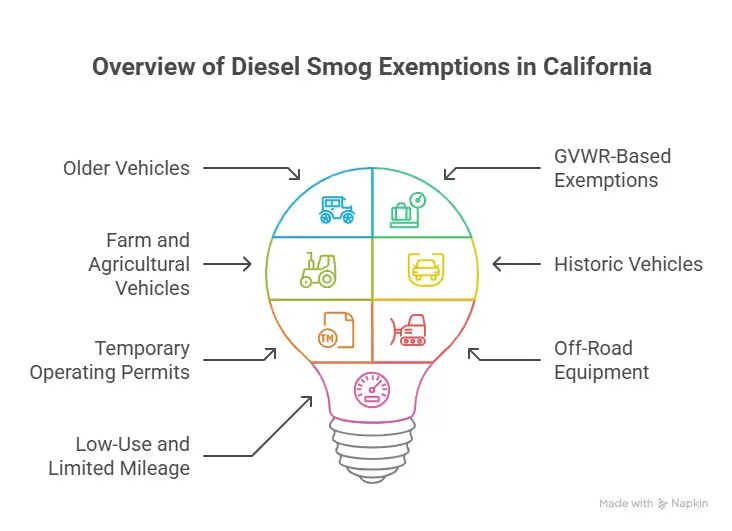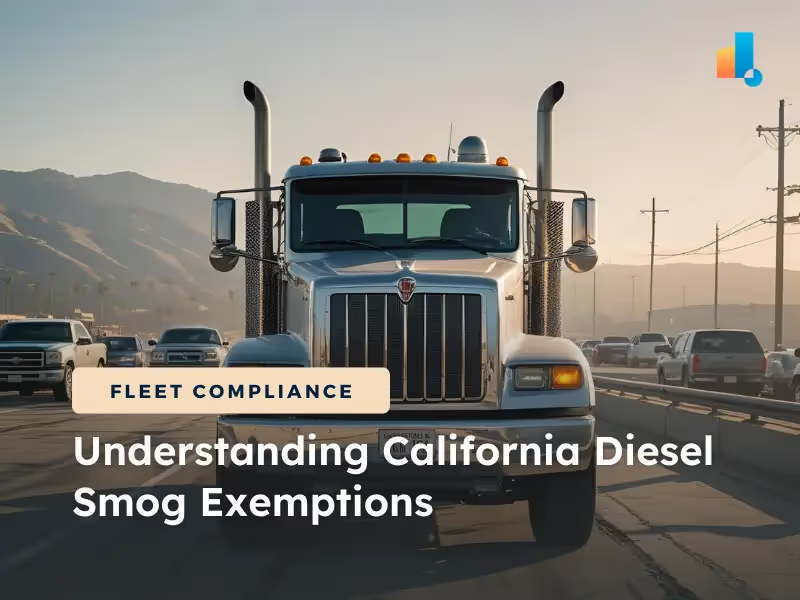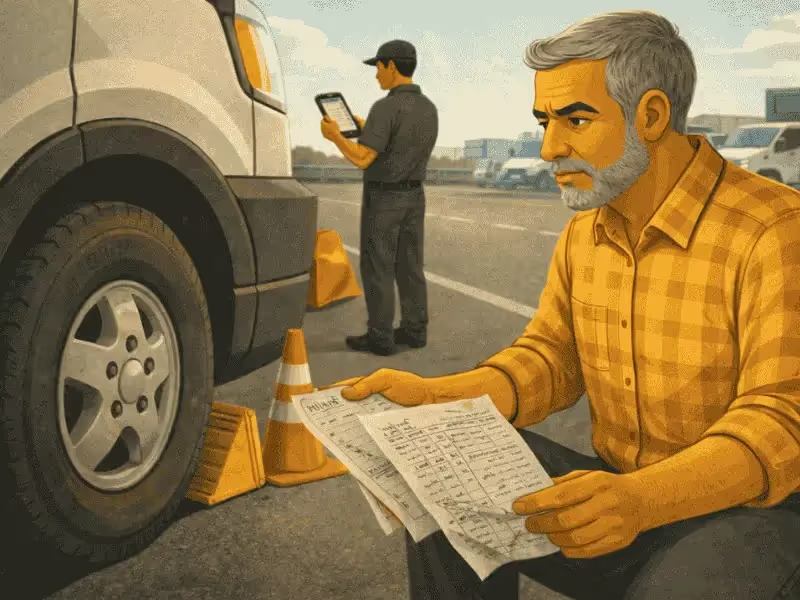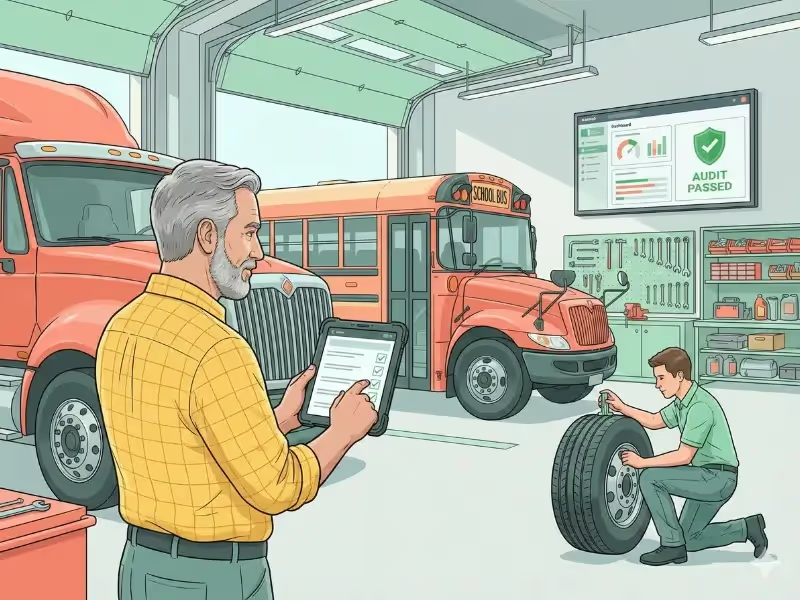Key Takeaways
California has strict diesel smog rules to reduce pollution and protect public health.
Some diesel vehicles are exempt, like farm trucks, older models (1997 or older), and historic vehicles.
Heavy-duty trucks must follow CARB rules but may get temporary exemptions or extensions.
Off-road and low-use vehicles can also qualify for special exemptions.
Missing compliance can lead to fines, registration holds, and lost revenue.
Using a fleet management tool like Simply Fleet helps track inspections, manage records, and stay compliant.
California is known for having some of the strictest air quality regulations in the United States, especially when it comes to diesel emissions. For fleet managers operating diesel trucks and vehicles in the state, dealing with these rules can be challenging. While California’s diesel smog regulations are comprehensive and rigorous, there are certain exemptions and special cases that fleet operators should be aware of.
Understanding these diesel smog exemptions can save your fleet time, money, and compliance headaches while keeping you aligned with the state’s ambitious air quality goals.
In this article, we’ll break down the key California diesel smog exemptions that apply to different vehicle types and circumstances. We’ll also provide practical tips on how your fleet can stay compliant, optimize operations, and avoid costly penalties.
Why Are Diesel Smog Regulations So Strict in California?

Before getting into exemptions, it’s important to understand why California’s regulations are among the toughest. Diesel engines emit nitrogen oxides (NOx) and particulate matter (PM), pollutants that contribute significantly to smog, respiratory problems, and environmental degradation.
The California Air Resources Board (CARB) enforces strict emissions standards for diesel vehicles to improve air quality, especially in regions like Los Angeles and the Central Valley, which struggle with poor air quality. The state mandates regular smog checks, fuel standards, and engine upgrades or replacements for diesel fleets.
Because these regulations can be costly and operationally disruptive, exemptions exist to balance environmental goals with practical realities.
What Are Diesel Smog Exemptions in California?
A diesel smog exemption means a vehicle or equipment is not required to undergo the typical emissions testing or meet certain emission standards under specific conditions. Exemptions can vary by vehicle type, age, weight, usage, and emissions control technology.
Here are the primary types of diesel smog exemptions fleet managers should know:
Exemption for Diesel Vehicles 1997 Model Year and Older
Light-duty diesel vehicles and trucks older than a certain model year (typically 1997 or older) are often exempt from California’s biennial smog check requirements. This is because these vehicles were manufactured before modern emissions controls and are generally grandfathered in.
- Key Point: These vehicles are exempt from smog checks but are not exempt from meeting basic registration requirements and must still comply with other state laws.
- Impact for Fleets: Many older trucks or off-road vehicles fall into this category, but relying on aging diesel engines can be costly in fuel, maintenance, and environmental impact.
Exemptions Based on Gross Vehicle Weight Rating (GVWR)
California distinguishes diesel vehicle regulations based on GVWR:
- Light-duty diesel vehicles (≤ 14,000 pounds GVWR): Subject to regular smog checks every two years.
- Heavy-duty diesel vehicles (> 14,000 pounds GVWR): Subject to more stringent regulations under CARB’s Truck and Bus Regulation and Clean Truck Check (CTC) programs.
In some cases, vehicles with a GVWR above 14,000 pounds but used exclusively off-road or for certain specialized purposes can qualify for exemptions from smog testing or registration requirements.
Farm and Agricultural Vehicle Exemptions
Diesel vehicles used solely for agricultural operations often qualify for exemptions or relaxed smog requirements.
- Criteria: Vehicle must be used exclusively on a farm or ranch, not driven on public roads except for limited distances.
- Example: Farm trucks that transport equipment or produce within the farm perimeter.
- Benefit: Reduces regulatory burden on agriculture-dependent fleets, which are crucial to California’s economy.
Historic Vehicle Exemption
Certain diesel vehicles classified as historic or classic vehicles (typically 25 years or older) may be exempt from smog certification requirements.
- Requirements: Vehicle must be registered as a historic vehicle and meet specific criteria laid out by the California DMV.
- Usage Limitations: These vehicles often have restrictions on mileage and use.
Temporary Operating Permit Exemptions
California allows temporary operating permits (TOPs) for vehicles that do not currently meet smog requirements, such as for sale or transfer.
- These permits can allow a vehicle to be driven legally for a short period without a valid smog certificate.
- TOPs are not a permanent exemption but provide a legal way to operate under special circumstances.
Exemptions for Off-Road and Portable Diesel Equipment
Not all diesel engines operate on roads. California regulates off-road diesel engines (construction equipment, agricultural machinery, generators) differently.
Some small portable diesel engines below certain horsepower thresholds or used under specific conditions may be exempt from emissions testing. These engines may still require permits but face less stringent testing.
Low-Use and Limited Mileage Exemptions
Certain diesel vehicles used minimally or with low annual mileage may qualify for smog exemptions or relaxed testing schedules. Such exemptions encourage reduced emissions through limited use.
Download our free Annual Vehicle Inspection Checklist
What About Heavy-Duty Trucks and CARB’s Truck and Bus Regulation?
For heavy-duty diesel trucks over 14,000 pounds GVWR, California’s regulations are strict but include some compliance pathways that might feel like exemptions:
- Engine Model Year Requirements: As of January 1, 2023, most heavy-duty trucks must have engines from 2010 or newer. However, trucks with older engines that meet specific retrofit or low-emission requirements can be temporarily exempted or granted extensions.
- Clean Truck Check Program: Requires registration and biennial emissions testing for in-use trucks. Fleets that comply with retrofit or replacement schedules may avoid fines or restrictions.
- Exemptions and Extensions: CARB may grant temporary compliance extensions for vehicles in certain situations, such as rare use or financial hardship, though these are limited and subject to strict conditions.
What Happens If You Don’t Qualify for an Exemption?
For fleets that do not qualify for any diesel smog exemption, compliance is mandatory. That means:
- Regular smog checks or emissions testing as required.
- Upgrading or retrofitting older diesel engines with approved emissions control devices, such as Diesel Particulate Filters (DPFs).
- Using cleaner diesel fuel meeting California’s Low Sulfur and Low Carbon Fuel Standards.
- Registering vehicles in CARB databases like the Clean Truck Check.
Non-compliance can lead to:
- Registration holds preventing renewal.
- Monetary fines and penalties.
- Operational disruptions or restrictions on where vehicles can operate.
Balancing Compliance and Efficiency with Diesel Smog Exemptions
California’s diesel smog regulations are designed to protect public health and the environment but can create operational challenges for fleet managers. Diesel smog exemptions offer relief for certain vehicle categories and situations, but understanding and correctly applying these exemptions is critical to avoid penalties and disruptions.
Ready to simplify your California diesel smog compliance? Simply Fleet offers expert fleet management solutions designed to keep your vehicles compliant, reduce downtime, and maximize efficiency.
Let us help you deal with exemptions, schedule timely inspections, and plan upgrades, all in one place. Contact Simply Fleet today and keep your diesel fleet running smoothly and legally in California.



.png)








.png)


.png)
%20(1).avif)







.avif)


